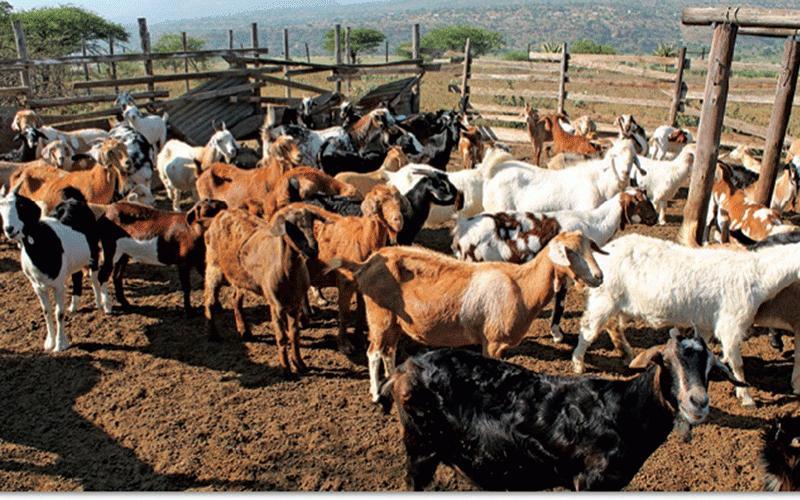Africa-Press – Zimbabwe. IN the rolling valleys of the Nyangani Mountain Range, a vibrant “butcher-in-the-backyard” goat-keeping scheme has emerged as a critical source of income and livelihood diversity for the local population in Nyanga South district, Manicaland province.
Across 11 villages in wards 19 and 21, this innovative project is transforming the livelihoods of inhabitants, providing a much-needed boost amid the region’s economic challenges.
Through in-depth interviews with district officials and villagers, this feature story explores the driving force behind this popular small livestock initiative and the profound impact it is having on the lives of those involved.
From the adaptability of dairy goats to the growing acceptance of goat milk products in the global market, this robust and human-interest piece delves into the compelling story of how a simple “butcher-in-the-backyard” scheme is unlocking new avenues for prosperity in this picturesque corner of Zimbabwe.
NewsDay recently visited project beneficiaries,who joyfully expressed gratitude and happiness.
“We used to sell our goats to middlemen who would take advantage of us,” says Mbuya Chigwanda (62) from Sedze village, ward 19.
“Now, we work as a co-operative to find the best buyers and ensure we get fair prices.
“It’s empowering to have that kind of collective bargaining power.”
Rixon Muchadeyi (68), from ward 19, Mambemba village, proudly stated in a recent interview: “Goats have become our panacea to income generation and livelihood growth.
“When the rains fail and our crops don’t do well, we can always count on our goats to put food on the table and send our children to school.”
The dairy goat-keeping project in Nyanga South is a great example of how sustainable income sources can be developed for rural communities, especially in arid and semi-arid regions.
The Global Environment Facility-UNDP Small Grants Programme (GEF-SGP),was instrumental in funding and supporting this initiative, including promoting environmental conservation, sustainability and community development.
Highly adaptable to a range of environments, from temperate grasslands to sub-tropical, arid to semi-arid regions, these hardy animals have become popular livestock across the globe.
“The government is actively promoting goat-keeping as a means of diversifying livelihoods and boosting household resilience,” said a research officer in the Lands, Agriculture, Fisheries, Water and Rural Development ministry.
“Goats are the perfect livestock for smallholder farmers,” explained Knowledge Zenda, the district environmental officer overseeing at the Nyanga South Rural District Council development projects.
“They require minimal resources, can thrive on marginal land and provide a steady stream of milk, meat and additional income through the sale of kids and breeding stock,” he added.
For the villagers of Nyanga South, this “butcher-in-the-backyard” scheme has been a game-changer.
Prior to the launch of the project in 2011, many households struggled to make ends meet, relying primarily on subsistence farming and casual labour.
However, the introduction of dairy goats has opened up new economic opportunities, empowering residents to take control of their own development and financial needs.
“I have managed to send my children to school and some to university,” says 52-year-old Anna Chigwanda, a participant from ward 21, Nyahokwe village.
“I have also managed to save for emergencies. It’s been really life-changing,” she stated humbly.
The project’s success hinges on a comprehensive approach that addresses the multifaceted needs of the community.
Besides GEF-SGP, in addition to providing the initial stock of dairy goats, the other implementing partners — a collaboration among the local government, non-profit organisations and community-based groups — have invested heavily in training and capacity building.
“We don’t just hand out the goats and leave,” explained Muchadeyi.
“Our team works closely with the villagers, teaching them about proper feeding, health management and breeding techniques.
“We also help them to set up the necessary infrastructure, like secure pens and watering points.”
This holistic support has been crucial in empowering the participants to become self-sufficient.
Rather than solely relying on the project’s resources, the villagers are now equipped with the knowledge and skills to manage their own herds, ensuring the long-term sustainability of the initiative.
“At first, I was nervous about taking care of the goats,” admits Shelter Nyatondo.
“But the training we received gave me the confidence to be a successful goat farmer.
“I can now breed and sell my own kids, and even produce milk for my family and the local market.”
The project’s impact extends beyond the individual households, too.
By working together in small groups through Chitsanza Development Association, a community-based organisation, the villagers were able to pool their resources, negotiate better prices and access larger markets for their products.
Moreover, the project has also fostered a renewed sense of community and co-operation among the participating villages — Mambemba, Bonde, Bore, Nyatondo, Tundumaro, Matsapa, Nhamburiko, Nhemachena, Ngaasekwe, Sedze, Nyahokwe.
Regular meetings and shared learning sessions have strengthened the bonds between residents, creating a supportive and progressive network that extends beyond the immediate social and economic benefits.
“It’s not just about the money,” observed headman Peter Nyahokwe.
“This project has brought the people of Nyanga South together, instilling a spirit of entrepreneurship and self-reliance.
“They’re not just passive recipients of aid; they’re active partners in their own development.”
With the growing global demand for goat milk products and the adaptability of dairy goats to the region’s climate, the “butcher-in-the-backyard” scheme holds the potential for further expansion and diversification.
Zenda is optimistic about its long-term prospects.
“We’re already seeing the positive ripple effects of this project.
“Villagers are investing their profits in other homestead income-generating activities, like vegetable gardening and small-scale poultry farming.
“It’s creating a sustainable cycle of growth and prosperity.”
For More News And Analysis About Zimbabwe Follow Africa-Press






